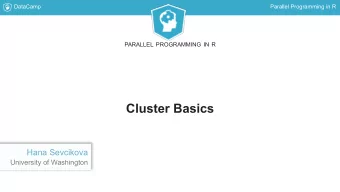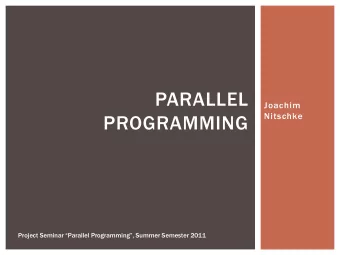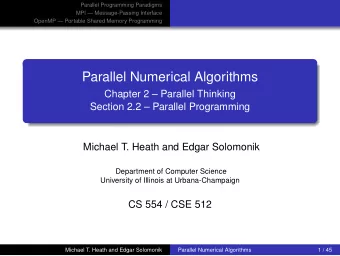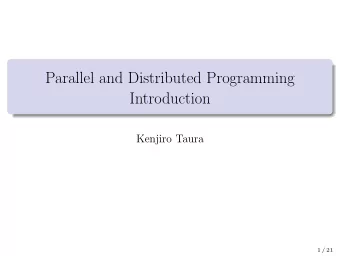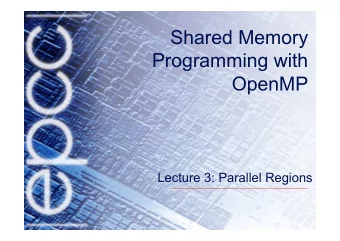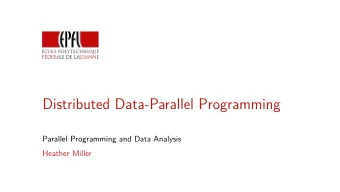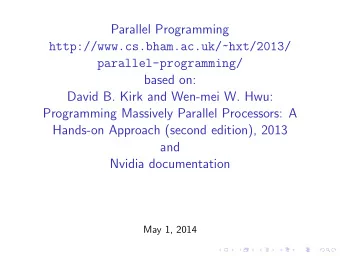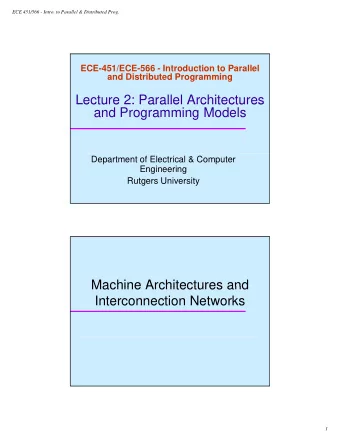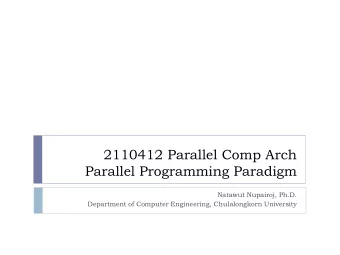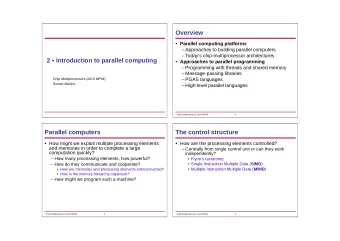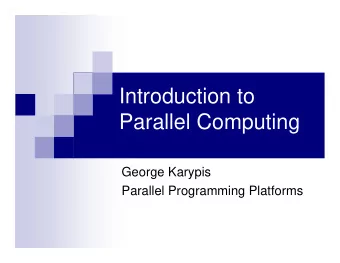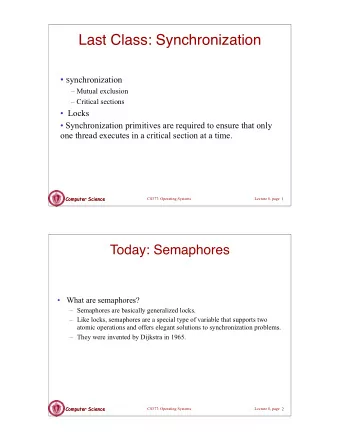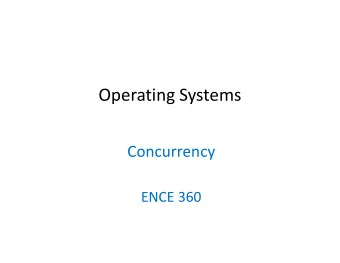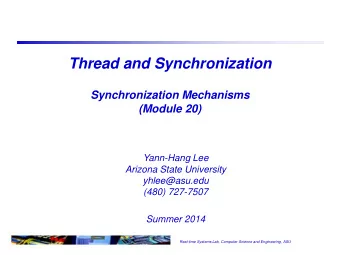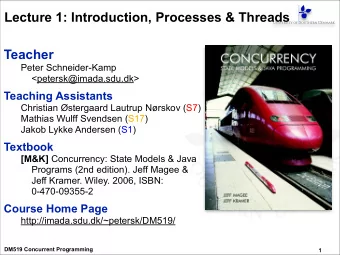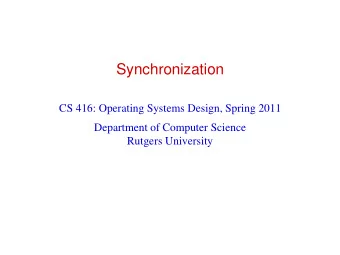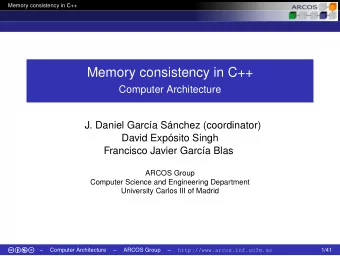
30. Parallel Programming IV Futures, Read-Modify-Write Instructions, - PowerPoint PPT Presentation
30. Parallel Programming IV Futures, Read-Modify-Write Instructions, Atomic Variables, Idea of lock-free programming [C++ Futures: Williams, Kap. 4.2.1-4.2.3] [C++ Atomic: Williams, Kap. 5.2.1-5.2.4, 5.2.7] [C++ Lockfree: Williams, Kap.
30. Parallel Programming IV Futures, Read-Modify-Write Instructions, Atomic Variables, Idea of lock-free programming [C++ Futures: Williams, Kap. 4.2.1-4.2.3] [C++ Atomic: Williams, Kap. 5.2.1-5.2.4, 5.2.7] [C++ Lockfree: Williams, Kap. 7.1.-7.2.1] 1001
Futures: Motivation Up to this point, threads have been functions without a result: void action(some parameters){ ... } std::thread t(action, parameters); ... t.join(); // potentially read result written via ref − parameters 1002
Futures: Motivation Now we would like to have the following T action(some parameters){ main ... return value; action } a t a d std::thread t(action, parameters); ... value = get_value_from_thread(); 1003
We can do this already! We make use of the producer/consumer pattern, implemented with condition variables Start the thread with reference to a buffer We get the result from the buffer. Synchronisation is already implemented 1004
Reminder template <typename T> class Buffer { std::queue<T> buf; std::mutex m; std::condition_variable cond; public: void put(T x){ std::unique_lock<std::mutex> g(m); buf.push(x); cond.notify_one(); } T get(){ std::unique_lock<std::mutex> g(m); cond.wait(g, [&]{return (!buf.empty());}); T x = buf.front(); buf.pop(); return x; } }; 1005
Application void action(Buffer<int>& c){ main // some long lasting operation ... c.put(42); action } a t a d int main(){ Buffer<int> c; std::thread t(action, std::ref(c)); t.detach(); // no join required for free running thread // can do some more work here in parallel int val = c.get(); // use result return 0; } 1006
With features of C++11 int action(){ main // some long lasting operation return 42; action } a t a d int main(){ std::future<int> f = std::async(action); // can do some work here in parallel int val = f.get(); // use result return 0; } 1007
30.2 Read-Modify-Write 1008
Example: Atomic Operations in Hardware 1009
Read-Modify-Write Concept of Read-Modify-Write: The effect of reading, modifying and writing back becomes visible at one point in time (happens atomically). 1010
Psudocode for CAS – Compare-And-Swap bool CAS(int& variable, int& expected, int desired){ if (variable == expected){ variable = desired; return true; atomic } else{ expected = variable; return false; } } 1011
Application example CAS in C++11 We build our own (spin-)lock: class Spinlock{ std::atomic<bool> taken {false}; public: void lock(){ bool old = false; while (!taken.compare_exchange_strong(old=false, true)){} } void unlock(){ bool old = true; assert(taken.compare_exchange_strong(old, false)); } }; 1012
30.3 Lock-Free Programming Ideas 1013
Lock-free programming Data structure is called lock-free : at least one thread always makes progress in bounded time even if other algorithms run concurrently. Implies system-wide progress but not freedom from starvation. wait-free : all threads eventually make progress in bounded time. Implies freedom from starvation. 1014
Progress Conditions Non-Blocking Blocking Everyone makes Wait-free Starvation-free progress Someone makes Lock-free Deadlock-free progress 1015
Implication Programming with locks: each thread can block other threads indefinitely. Lock-free: failure or suspension of one thread cannot cause failure or suspension of another thread ! 1016
Lock-free programming: how? Beobachtung: RMW-operations are implemented wait-free by hardware. Every thread sees his result of a CAS or TAS in bounded time. Idea of lock-free programming: read the state of a data sructure and change the data structure atomically if and only if the previously read state remained unchanged meanwhile. 1017
Example: lock-free stack Simplified variant of a stack in the following pop prüft nicht, ob der Stack leer ist pop gibt nichts zurück 1018
(Node) value next Nodes: struct Node { value T value; next Node<T> ∗ next; value Node(T v, Node<T> ∗ nxt): value(v), next(nxt) {} next }; value next 1019
(Blocking Version) template <typename T> class Stack { value top Node<T> ∗ top=nullptr; next std::mutex m; public: value void push(T val){ guard g(m); next top = new Node<T>(val, top); } value void pop(){ guard g(m); next Node<T> ∗ old_top = top; top = top − >next; value delete old_top; next } }; 1020
Lock-Free template <typename T> class Stack { std::atomic<Node<T> ∗ > top {nullptr}; public: void push(T val){ Node<T> ∗ new_node = new Node<T> (val, top); while (!top.compare_exchange_weak(new_node − >next, new_node)); } void pop(){ Node<T> ∗ old_top = top; while (!top.compare_exchange_weak(old_top, old_top − >next)); delete old_top; } }; 1021
Push void push(T val){ Node<T> ∗ new_node = new Node<T> (val, top); while (!top.compare_exchange_weak(new_node − >next, new_node)); } 2 Threads: top 1022
Push void push(T val){ Node<T> ∗ new_node = new Node<T> (val, top); while (!top.compare_exchange_weak(new_node − >next, new_node)); } 2 Threads: new top new 1022
Push void push(T val){ Node<T> ∗ new_node = new Node<T> (val, top); while (!top.compare_exchange_weak(new_node − >next, new_node)); } 2 Threads: new top new 1022
Push void push(T val){ Node<T> ∗ new_node = new Node<T> (val, top); while (!top.compare_exchange_weak(new_node − >next, new_node)); } 2 Threads: new top new 1022
Push void push(T val){ Node<T> ∗ new_node = new Node<T> (val, top); while (!top.compare_exchange_weak(new_node − >next, new_node)); } 2 Threads: new top new 1022
Pop void pop(){ Node<T> ∗ old_top = top; while (!top.compare_exchange_weak(old_top, old_top − >next)); delete old_top; } 2 Threads: top 1023
Pop void pop(){ Node<T> ∗ old_top = top; while (!top.compare_exchange_weak(old_top, old_top − >next)); delete old_top; } 2 Threads: old top old 1023
Pop void pop(){ Node<T> ∗ old_top = top; while (!top.compare_exchange_weak(old_top, old_top − >next)); delete old_top; } 2 Threads: old top old 1023
Pop void pop(){ Node<T> ∗ old_top = top; while (!top.compare_exchange_weak(old_top, old_top − >next)); delete old_top; } 2 Threads: old top old 1023
Pop void pop(){ Node<T> ∗ old_top = top; while (!top.compare_exchange_weak(old_top, old_top − >next)); delete old_top; } 2 Threads: old top old 1023
Lock-Free Programming – Limits Lock-Free Programming is complicated. If more than one value has to be changed in an algorithm (example: queue), it is becoming even more complicated: threads have to “help each other” in order to make an algorithm lock-free. The ABA problem can occur if memory is reused in an algorithm. A solution of this problem can be quite expensive. 1024
Recommend
More recommend
Explore More Topics
Stay informed with curated content and fresh updates.
